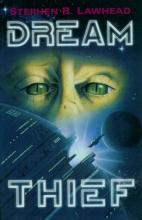inspiration + perspiration = invention :: T. Edison ::

My rating: 2 of 5 stars
I've read from several sources that one way to cut down on stress is to avoid reading books that you don't like. The idea goes that if after a few chapters (or pages, depending on the attention span of the advice giver) you don't like the story, ditch the book and move on to another. I don't necessarily disagree with this idea as a whole; I just find it very hard to put into personal practice. Once I make a commitment to read a particular story or watch a specific program, I usually try to give it all possible opportunity to engage me before panning it. Perhaps that is why, after several false starts over the past three years, I finally finished Dream Thief by Stephen Lawhead.
This predilection also explains why I became torn upon its conclusion as to whether or not to give it two or three stars. However, I finally had to admit the inevitable: the book just wasn't good enough for more than two. That being said, it was good enough (especially toward the end) to finally complete the journey.
First, a short, spoiler-free summary: Dr. Spencer Reston (or Spence, to his few friends) is a workaholic researcher working at the best postdoc imaginable, the space station Gotham. He's supposed to be studying how living in this environment affects sleep. Instead, he's drawn into a web of conspiracy that involves his own rapidly devolving dreams, strange findings on Mars, and occultic traditions in the heart of one of Earth's most ancient cultures. Along the way he garners enemies and allies, learns what it means to love, and becomes enthralled by a great cosmic mystery that will change his world forever.
Sounds great, right? Unfortunately, this excellent idea for a novel is mired by a slow, plodding start, an anemic protagonist and even flakier antagonists, and overall a lack of focus in its storytelling. Once Spence eventually leaves the station, everything picks up: he becomes a more fleshed-out character, the villains become truly menacing, and the actual plot really gets going. No surprise for this author of lore, Lawhead is at his best when dealing with elements of mysticism and cultural history. The part set on Earth is quite intriguing as Lawhead weaves the clues of past and present together. At the risk of sounding cheeky, I feel like Lawhead really wanted to write the last half of the book and the first half was simply the means of getting there.
The real problem with the novel's conclusion comes from the weak setup. Spence gets the chance to mature and grow, and while I quickly gave up on his supposed "married to the work" scientist persona (he shows precious little interest in his work at the beginning, and abandons it for adventure and romance at the first opportunity), he becomes a likeable enough plucky hero by the end of the novel that I could root for his success. In actuality, this novel would have been far more interesting if the main conflict had been internal, with the dreams actually being an organic exploration of his own psyche wrestling with what he has always believed to be true and the truth he must come to accept. As it is, the two henchmen we meet to begin with are traditionally flat villains who only desire power (I could almost see them fingering their black mustaches), and the eventual true mastermind of the plot is made impotent by the time of his ultimate reveal (which failed to surprise, considering the obvious hints dropped), leading to a disappointing and anticlimactic endgame for the narrative. In my opinion, this is one story that would have worked better without outside villains.
The book has its moments of interest and engagement, but ultimately fails to rise above its inherent structural weaknesses. If you're just starting with Lawhead, read his fantasy. This example of his foray into science fiction leaves much to be desired.
This review was previously posted at Goodreads and Amazon. I did not receive anything from the publisher or author for this review (but they're free to send me something now if they'd like). The book is currently available from Amazon as a Paperback ($27.95) and eBook ($2.99).





